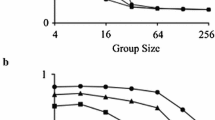Abstract
The question whether ethical behavior is biologically determined may refer either to thecapacity for ethics (e.i., the proclivity to judge human actions as either right or wrong), or to the moralnorms accepted by human beings for guiding their actions. My theses are: (1) that the capacity for ethics is a necessary attribute of human nature; and (2) that moral norms are products of cultural evolution, not of biological evolution.
Humans exhibits ethical behavior by nature because their biological makeup determines the presence of the three necessary, and jointly sufficient, conditions for ethical behavior: (i) the ability to anticipate the consequences of one's own actions; (ii) the ability to make value judgements; and (iii) the ability to choose between alternative courses of action. Ethical behavior came about in evolution not because it is adaptive in itself, but as a necessary consequece of man's eminent intellectual abilities, which are an attribute directly promoted by natural selection.
Since Darwin's time there have been evolutionists proposing that the norms of morality are derived from biological evolution. Sociobiologists represent the most recent and most subtle version of that proposal. The sociobiologists' argument is that human ethical norms are sociocultural correlates of behaviors fostered by biological evolution. I argue that such proposals are misguided and do not escape the naturalistic fallacy. The isomorphism between the behaviors promoted by natural selection and those sanctioned by moral norms exist only with respect to the consequences of the behaviors; the underlying causations are completely disparate.
Similar content being viewed by others
References
Alexander, R. D.: 1979,Darwinism and Human Affairs, Univ. of Washington Press, Seattle.
Ardrey, R.: 1966,The Territorial Imperative, Aheneum, New York.
Ayala, F. J.: 1980,Origen y Evolución del Hombre, Alianza Editorial, Madrid.
Ayala, F. J.: 1982a, ‘The Evolutionary concept of Progress’, in G. A. Almondet al., (eds.),Progress and Its Discontents, Univ. of California Press, pp. 106–124. Berkeley.
Ayala, F. J.: 1982b, ‘La Naturaleza Humana a la Luz de la Evolución’,Estudios Filosóficos 31, 397–441.
Barash, D. P.: 1977,Sociobiology and Behavior, Elsevier, New York.
Dobzhansky, Th.: 1962,Mankind Evolving, Yale Univ. Press, New Haven.
Dobzhansky, Th.: 1973, ‘Ethics and Values in Biological and Cultural Evolution’,Zygon 8, 261–281.
Hamilton, W. D.: 1964, ‘The Genetical Evolution of Social Behavior’,Journal of Theoretical Biology 7, 1–51.
Hume, D.: (1740) 1978,Treatise of Human Nature, Oxford Univ. Press, Oxford.
Huxley, J. S.: 1953,Evolution in Action, Harper, New York.
Huxley, T. H. and J. S. Huxley: 1947,Touchstone for Ethics, Harper, New York.
Lorenz, K.: 1963,On Aggression, Harcourt, Brace and World, New York.
Moore, G. E.: 1903,Principia Ethica, Cambridge Univ. Press.
Ruse, M.: 1986,Talking Darwin Seriously: A Naturalistic Approach to Philosophy, Basil Blackwell, Oxford.
Ruse, M.: 1986b, ‘Evolutionary Ethics: A Phoenix Arisen’,Zygon 21, 95–112.
Ruse, M., and E. O. Wilson: 1986, ‘Moral Philosophy as Applied Science’,Philosophy.
Simpson, G. G.: 1949,The Meaning of Evolution, Yale University Press, New Haven.
Simpson, G. G.: 1969,Biology and Man, Harcourt, Brace and World, New York.
Spencer, H.: 1893,The Principles of Ethics, London.
Stent, G. S., ed.: 1978,Morality as a Biological Phenomenon, Dahlem, Berlin.
Waddington, C. H.: 1960,The Ethical Animal, Allen & Unwin, London.
Wilson, E. O.: 1975,Sociobiology, the New Synthesis, Belknap, Cambridge.
Wilson, E. O.: 1978,On Human Nature, Harvard Univ. Press, Cambridge.
Author information
Authors and Affiliations
Additional information
This article is based on a paper presented at the International Symposium onBiological Models of Human Action, Palma de Mallorca, Spain, 16–18 December 1985.
Rights and permissions
About this article
Cite this article
Ayala, F.J. The biological roots of morality. Biol Philos 2, 235–252 (1987). https://doi.org/10.1007/BF00128831
Issue Date:
DOI: https://doi.org/10.1007/BF00128831




